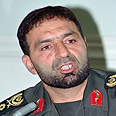
Iran Guards: Officer killed in blast a 'martyr'
Senior Revolutionary Guards member says Hassan Tehrani Moqaddam's work helped Hezbollah, Hamas 'triumph over Israel' in wars
A day after a mysterious explosion killed at least 17 people at an Iranian Revolutionary Guard Corps base near Tehran, Iranian media outlets on Sunday published photos of a senior officer who was killed in the blast.
In an obituary published by the Revolutionary Guards, Hassan Tehrani Moqaddam, whose rank was equivalent to that of a brigadier general, is described as a "shahid (martyr)" and one of the key figures in Iran's missile program. The Guards vowed to continue in Moqaddam's "path."
Related articles:
The funeral of Moqaddam and the other 16 people killed in the blast is scheduled for Monday morning.
Moqaddam, according to the obituary, was one of the "cornerstones" of the artillery and missile units at the Revolutionary Guards during the Iran-Iraq war. "We will continue in his path and in the paths of the rest of the shahids – a path of courage, advancement and growing deterrence of the regime and the Islamic homeland," the obituary read.
The officer reportedly served as a researcher at a Tehran university and headed the "Jihad Self-Reliance" unit, mostly tasked with developing arms and missiles.
Senior Guards member Mustafa Izadi published an article saying Moqaddam's research helped the terror groups fight Israel. "Undoubtedly, the blessed ideas of this shahid assisted in the victories of Hezbollah in the 33-day war (Second Lebanon War) and Hamas in the 22-day war (Operation Cast Lead in Gaza)," Izadi wrote. He was apparently referring to Moqaddam's contribution to the development of short-range missiles, which Iran transfers to the terror groups.
According to reports based on information provided by Iranian opposition groups, the base in which the blast occurred stores Shahab-3 as well as surface-to-surface missiles.
The explosion on Saturday rocked the base at Bid Ganeh, near the town of Malard on the western outskirts of Tehran, some 20 kilometers (12 miles) from the city, according to media reports.
Set up after the 1979 Islamic revolution to defend Iran against internal and external threats, the Guards are in charge of the Islamic republic’s missile program, including Shahab-3 missiles with a range of 2,000 kilometers (1,200 miles) capable of hitting Israel.
Despite four sets of UN Security Council sanctions, Iran has refused to abandon its nuclear and missile programs.
Saturday’s blast came amid a spike in international condemnation of Iran following the release of a new UN nuclear watchdog report accusing Tehran of working towards the development of nuclear warheads to fit inside its medium-range missiles.
Israeli officials in past weeks have warned Iran of the possibility of military strikes against its nuclear sites.
US blogger Richard Silverstein said Saturday that Israel was the mastermind behind the blast.
In his blog, Tikun Olam, Silverstein quotes an Israeli expert as saying that the Mossad was responsible for the explosion, in collaboration with the Iranian militant opposition group Mojahedin-e-Khalq.
US military experts in late October suggested in Congress that the United States organized covert operations to assassinate the commanders of the Revolutionary Guards.
AFP contributed to the report
- Receive Ynetnews updates directly to your desktop










